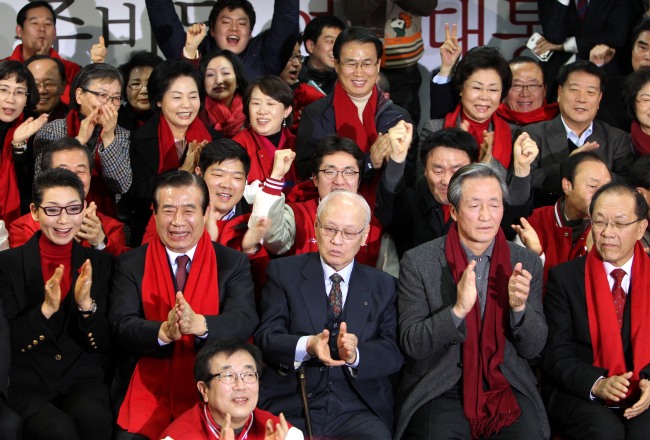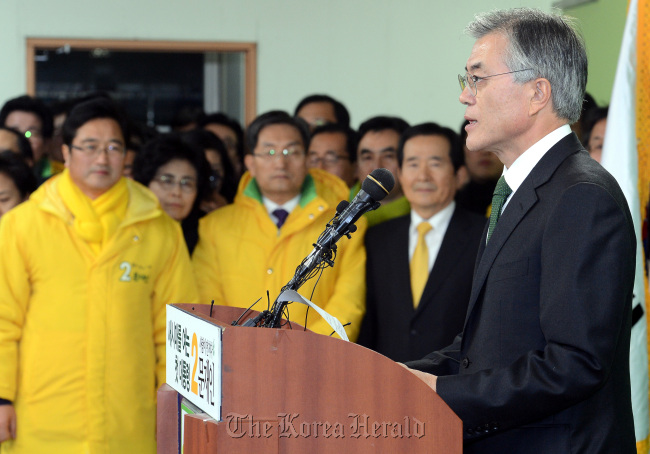
Validating her perseverance through years of solitude and integrity demonstrated throughout her 15-year political career, Park Geun-hye won her presidency on the platform of unity.
Park, strong enough to save her party from multiple crises, overcame her chronic drawback of being the daughter of late President Park Chung-hee as the public chose over change.
Her win shows that while the public is aware of her rather old-fashioned decision-making manner, it would still prefer her to lead them through the daunting tasks of balancing growth and distribution, creating a welfare state and adjusting foreign policies with the powerful neighbors and North Korea.
“Park shows an epicene leadership style,” said Choi Jin, head of the Institute of Presidential Leadership.
“Her tenacious leadership learned under her father and developed through ups and downs in politics has made her unflinching to most threats,” he added.
Her aides describe her leadership as “enigmatic,” an appropriate term given her tendency to keep her distance with even her closest people. It is a habit that she seemingly acquired upon seeing her father’s former aides turn on him after his assassination in 1979.

Ever since making her presidential bid on July 10, Park has generally maintained a lead in various polls against her rivals Moon Jae-in of the Democratic United Party and professor-turned-politician Ahn Cheol-soo, with support consistently above 40 percent.
With her increased confidence and sturdier clout, the mainstream members of the ruling Saenuri Party began assembling to prepare for her presidential campaign, with her potentially biggest rival Ahn’s bid still pending.
As more candidates from the Saenuri Party emerged, Park faced what would be her first big hurdle, as the non-Park members demanded a change of rules for fully open primaries.
Determined not to repeat her 2007 failure, where she lost to then-rival President Lee Myung-bak in a close public vote, Park remained resolutely against it despite facing criticism for her stubbornness.
Her decision appeared to have worked, as the controversy soon died down after her internal rivals Reps. Chung Mong-joon and Lee Jae-oh quit the race.
On Aug. 20, Park became the ruling party’s presidential candidate with overwhelming endorsement ― gaining 84 percent of the votes.
By quickly naming Kim Chong-in to her brain trust, Park successfully seized the maxim of economic democratization.
“It can be said that she successfully nabbed the progressive’s value, which otherwise would have placed her at an ultimate disadvantage,” said professor Yoon Pyung-joong of Hanshin University.
“She managed to neutralize the ruling party’s weakness aggravated by the incumbent government under which polarization widened, and play down the gaps between the policies of the ruling and opposition parties in terms of economy,” he added.
But Park’s second and perhaps the most personal obstacle came from her opponents playing up her association with the dictatorial rule of her father.
Park added fuel to the fire by commenting during a radio interview that there were two verdicts in the Inhyeokdang case on Sept. 10.
As public outcry spread and her aides grew more agitated, Park finally held her first public statement on Sept. 24 addressing the oppression by her father.
By that time, Ahn had joined the race by declaring his much-awaited bid on Sept. 19, and his popularity ratings quickly threatened her frontrunner status by closely trailing or even surpassing hers. Moon, who had thrown his hat into the ring on June 17, was also catching up. His ratings, which had hovered around 5 percent, surged to 15 percent.
“The apology on behalf of her father came a little too late, although it was still better late than never,” Yoon said.
“But her begrudging apology cost her significant points.”
As the single candidacy talks between Moon and Ahn protracted in November, her popularity polls recovered as the race increasingly shaped into conservative versus progressive.
“After her campaign was appropriately launched on grand unity, it faced a hitch upon the controversy over her historical interpretation, although it also worked to gather the conservatives,“ professor Shin Yul of Myongji University said.
Upon the half-baked single candidacy deal between Moon and Ahn on Dec. 6, Park used the opportunity to accentuate her being “prepared” and “holding true to promises.”
“Although her leadership may be old-fashioned, it can be perceived as an advantage at a time of crisis,” Shin suggested.
As the election day approached, Park met another challenge: 100-minute televised debates, in which she showed less-than-stellar performances. The rivalry between Park and Moon quickly turned into an evaluation of the former Roh Moo-hyun government and the incumbent Lee Myung-bak administration.
Voter turnout was considered crucial as the race of ideology kept the suspense until the very end with Moon inching closer to Park ― even sometimes surpassing her ― in last-minute surveys.
The two’s ratings that had stood at 49.5 percent (Park) and 45.3 percent (Moon) as of Dec. 6, widened apart at 52.0 percent and 44.1 percent, respectively, two days later, before they closed in at 48.3 percent (Park) and 47.1 percent on Dec. 11, and 48.2 percent and 48.0 percent on Dec. 12, according to pollster Realmeter.
By Lee Joo-hee
(jhl@heraldcorp.com)
-
Articles by Korea Herald












![[Today’s K-pop] BTS pop-up event to come to Seoul](http://res.heraldm.com/phpwas/restmb_idxmake.php?idx=644&simg=/content/image/2024/04/17/20240417050734_0.jpg&u=)





![[KH Explains] Hyundai's full hybrid edge to pay off amid slow transition to pure EVs](http://res.heraldm.com/phpwas/restmb_idxmake.php?idx=652&simg=/content/image/2024/04/18/20240418050645_0.jpg&u=20240419100350)

![[Today’s K-pop] Zico drops snippet of collaboration with Jennie](http://res.heraldm.com/phpwas/restmb_idxmake.php?idx=642&simg=/content/image/2024/04/18/20240418050702_0.jpg&u=)